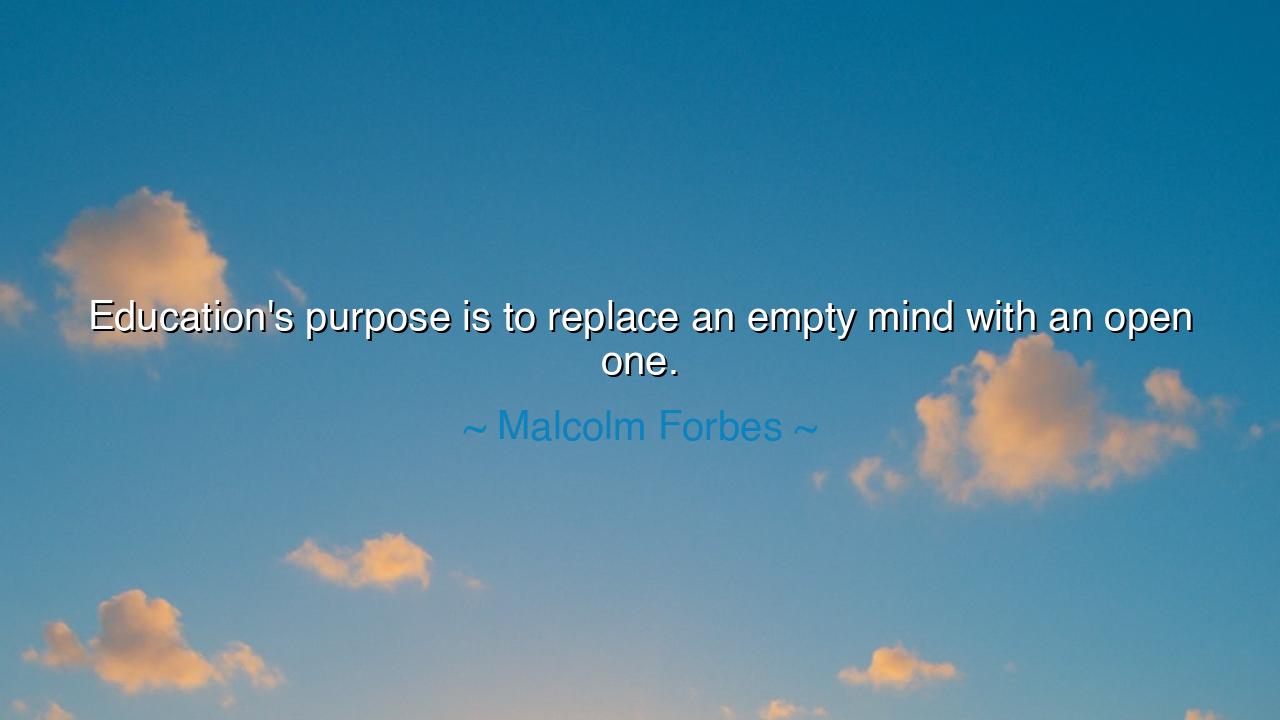
Education's purpose is to replace an empty mind with an open one.






In the thoughtful words of Malcolm Forbes, a man who understood both the power of enterprise and the depth of human potential, we find this luminous truth: “Education’s purpose is to replace an empty mind with an open one.” It is a statement not merely about schooling, but about the transformation of the soul. For education, in its truest form, is not the filling of the head, but the awakening of the heart; not the accumulation of facts, but the birth of understanding. Forbes, whose life spanned a century of invention and change, saw that a man may be well-trained and still ignorant, but one whose mind is open—receptive, questioning, and alive—has already touched the edge of wisdom.
To say that education replaces an empty mind with an open one is to remind us that ignorance is not the absence of knowledge—it is the refusal to seek it. An empty mind is not dangerous because it knows nothing, but because it believes it has nothing to learn. It is a closed room, sealed from the light. The purpose of education, then, is not to boast of answers, but to cultivate openness—to teach humility before truth, curiosity before certainty, and empathy before judgment. True learning does not build walls; it opens windows. It replaces the silence of emptiness with the music of wonder.
Consider the story of Galileo Galilei, who gazed into the heavens and dared to see what others refused to. The world of his time was full of educated men—priests, philosophers, scholars—who could recite every known theory of the cosmos. But their minds were not open; they were confined by doctrine and fear. Galileo, though persecuted, became the living symbol of what Forbes meant: a man whose education had not filled his mind with dogma, but opened it to discovery. Through his courage, humanity learned that the purpose of learning is not to defend what is known, but to explore what is not.
There is a vast difference between a trained mind and an open mind. Training teaches one how to repeat; openness teaches one how to think. Training seeks conformity; openness seeks truth. The world is full of people who have studied much, yet understood little—who can quote sages but live like fools. The open mind, however, questions its own beliefs. It does not fear the new or the unfamiliar. It is humble enough to change, wise enough to listen, and brave enough to admit when it has been wrong. For as long as the mind remains open, the soul continues to grow.
Education, therefore, is not a ceremony of memorization, but a sacred process of awakening. To open the mind is to recognize that every person, every culture, every idea has a story to tell—and that truth is too vast to belong to one people alone. The open mind sees beyond prejudice and hears beyond pride. It does not mock the unknown, but seeks to understand it. Such a mind becomes fertile ground where compassion grows beside intellect, and wisdom blossoms beside knowledge.
History has shown that every great leap of civilization began with openness: Socrates questioning the old gods of Athens, Confucius urging moral reflection over ritual, Einstein daring to imagine space and time entwined. Each of these souls was educated not merely by books, but by openness of spirit—the courage to think beyond convention. Their minds were not filled; they were freed. Their education was not a cage, but a key. And through their openness, the world itself became larger.
The lesson in Forbes’ words is clear and eternal: seek education not to possess knowledge, but to become teachable. Let every lesson, every conversation, every failure be a doorway to greater understanding. Do not guard your mind like a fortress; keep it as a garden—tended, alive, ever-reaching for the light. To be open is not to be uncertain; it is to be strong enough to grow, and humble enough to learn.
And so, let this teaching echo through generations: an empty mind is a desert, but an open mind is a horizon. Strive not to know everything, but to wonder at everything. Be curious, not proud. Be questioning, not cynical. For the true purpose of education is not to make one clever, but to make one awake—to replace emptiness with openness, and to transform the mind into a mirror that forever reflects the endless beauty of truth.






AAdministratorAdministrator
Welcome, honored guests. Please leave a comment, we will respond soon